|
Handel:
Messiah
by Philip
Anson
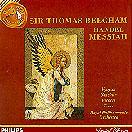 Sir Thomas Beecham.
Royal Philharmonic Orchestra &;Choir. Recorded 1959 (RCA Gold
Seal 09026-61266-2). Beecham's recording of Goosens' orchestration
with harp, drums, cymbals, bells and brass is shamelessly
melodramatic and old-fashioned. The result? Pure fascination. The
set is priceless for tenor Jon Vickers alone. Bass Giorgio Tozzi is
also stunning. This oratorio must stand as one of the
greatest opera recordings ever made. Sir Thomas Beecham.
Royal Philharmonic Orchestra &;Choir. Recorded 1959 (RCA Gold
Seal 09026-61266-2). Beecham's recording of Goosens' orchestration
with harp, drums, cymbals, bells and brass is shamelessly
melodramatic and old-fashioned. The result? Pure fascination. The
set is priceless for tenor Jon Vickers alone. Bass Giorgio Tozzi is
also stunning. This oratorio must stand as one of the
greatest opera recordings ever made.
John Eliot Gardiner. English Baroque Soloists &;Monteverdi
Choir. Recorded November 1982. (Philips 434-297-2). The 31 English
Baroque Soloists and 32 voices of the Monteverdi Choir produce a
grand, vigorous sound. Tenor Rolfe-Johnson is sweet-voiced and
aristocratic. Canadian Catherine Robbin may well be the best
Messiah mezzo on disc. Robert Hale has a light, lyrical
bass-baritone. Only countertenor Charles Brett is feeble. Among
"period" Messiahs this groundbreaking recording is a strong
recommendation.
Harry Christophers. The Sixteen Choir and Orchestra. Recorded
December 1986 (Hyperion Dyad CDD 22019). This is a superb budget
Messiah. The Sixteen is theoretically an authentic instrument
group, but you'd never guess it from the round, full-bodied sound
delivered by the 19 choristers and 20 instrumentalists. Soprano
Lynne Dawson has a crystalline, sunny voice perfectly suited to
"Rejoice greatly" and "I know that my Redeemer liveth". Contralto
Catherine Denley is competent in the stolid English church singing
tradition. Countertenor David James has a reedy, clarinettish voice,
clean and steady, without vibrato, though he has intonation problems
in the difficult "Refiner's fire" passage. Michael George is a
splendid bass with a resonant, pleasant tone and excellent diction.
Maldwyn Davies deploys a warm, pleasant, flexible tenor. Altogether
a happy, uninhibited performance. Highly recommended.
Paul
McCreesh. Gabrielli Players and Consort. Recorded December 1996
(Archiv 453-464-2). Wow! After many years without a new
Messiah, Deutsche Grammophon has struck gold. This vigorous,
beautiful recording is as good as or better than any other
Messiah. The Gabrielli Consort (24 voices) and Players (40)
produce a big sound but remain flexible enough to sketch in the
subtlest chiaroscuro. Soprano, contralto and tenor are all honest
singers. Bass-baritone Neil Davies is outstanding. DG engineers have
achieved exquisite clarity and balance between sections as well as
seamless blending and maximum dynamic spectrum without stress.
McCreesh's forces are professional without losing their humanity.
They combine to realize a sophisticated vision of the oratorio as a
series of dramatic tableaux, breathing new life into Handel's
masterpiece. A joy from beginning to end.
Verdi
Oberto
Academy of St. Martin in the Fields
Sir Neville
Marriner (Philips 454-472)
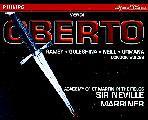 Oberto, Verdi's
first opera, here gets its second commercial recording, the latest
installment in Philips Classics' Young Verdi Series. Cast, choir,
orchestra and conductor are all excellent, making this one of the
best new releases of the year. Musically there is plenty to enjoy in
Verdi's firstborn. The ASMF and London Voices under Marriner
generate an irresistable wave of instinctive drama and orchestral
excitement. Arias and duets follow in rapid succession in a style
obviously indebted to the tuneful formulas of Rossini and Donizetti.
This is a soloists' opera and Sam Ramey, Maria Guleghina, Violeta
Urmana and Stuart Neill. are all preferable to the cast of the other
Oberto, conducted by Gardelli on Orfeo.
Tenor Stuart Neill gives a strong, lyrical reading of his
belcantoish role as Riccardo. He even pops out a high D which the
aging Carlo Bergonzi on Orfeo doesn't dare attempt. Guleghina and
Ramey in fine form complete this desirable offering. Sir Neville
Marriner includes three of Verdi's alternative arias, making this a
complete as well as charming recording.
PA Oberto, Verdi's
first opera, here gets its second commercial recording, the latest
installment in Philips Classics' Young Verdi Series. Cast, choir,
orchestra and conductor are all excellent, making this one of the
best new releases of the year. Musically there is plenty to enjoy in
Verdi's firstborn. The ASMF and London Voices under Marriner
generate an irresistable wave of instinctive drama and orchestral
excitement. Arias and duets follow in rapid succession in a style
obviously indebted to the tuneful formulas of Rossini and Donizetti.
This is a soloists' opera and Sam Ramey, Maria Guleghina, Violeta
Urmana and Stuart Neill. are all preferable to the cast of the other
Oberto, conducted by Gardelli on Orfeo.
Tenor Stuart Neill gives a strong, lyrical reading of his
belcantoish role as Riccardo. He even pops out a high D which the
aging Carlo Bergonzi on Orfeo doesn't dare attempt. Guleghina and
Ramey in fine form complete this desirable offering. Sir Neville
Marriner includes three of Verdi's alternative arias, making this a
complete as well as charming recording.
PA
Schumann Piano Sonata No. 1 &
Kreisleriana
Murray Perahia, piano (Sony SK
62786)
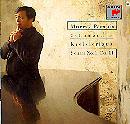 In
his ability to paint extended musical canvases on the scale of Old
Masters, Perahia is unique among living pianists. He brings
inimitable clarity and coherence to Schumann's long and complex
Piano Concerto No. 1, a work that can fragment and meander in
the wrong hands. Every gorgeous phrase of this love letter to Clara
is accurately weighted and colored. Unthinking pianists often play
Kreisleriana fast and hard as a virtuoso
showpiece. Perahia brings a subtle wittiness to this most literary
of keyboard fantasies. On a technical level his pulsing lyricism
reminds one of Horowitz. The deliciously clear Sony acoustics are a
huge improvement over Ashkenazy's foggy sound on London-Decca.
PA In
his ability to paint extended musical canvases on the scale of Old
Masters, Perahia is unique among living pianists. He brings
inimitable clarity and coherence to Schumann's long and complex
Piano Concerto No. 1, a work that can fragment and meander in
the wrong hands. Every gorgeous phrase of this love letter to Clara
is accurately weighted and colored. Unthinking pianists often play
Kreisleriana fast and hard as a virtuoso
showpiece. Perahia brings a subtle wittiness to this most literary
of keyboard fantasies. On a technical level his pulsing lyricism
reminds one of Horowitz. The deliciously clear Sony acoustics are a
huge improvement over Ashkenazy's foggy sound on London-Decca.
PA
- Le Secret
- Gino Quilico, baritone
- Alain Lefèvre, piano (Koch
KIC-CD-7412)
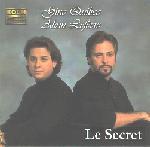 Gino Quilico's first
recital disc features French melodies by Fauré, Duparc, and Hahn -
not an obvious choice for a famous singer of Italian opera. Quilico
delivers a capable interpretation of these delicate French
masterpieces despite the weight and condition of his instrument. The
sound and technique are comparable to Gerard Souzay's late
recordings. Quilico caresses his music with a sincere affection that
doesn't blind us to legato problems, frailty in the upper range and
a dry, colorless pianissimo, though he does conquer the final notes
of Reynaldo Hahn's difficult "L'Heure Exquise". Quebec composer
Alain Payette's five-song cycle on poems by Gustav Labbé fills out
the program. These pleasant, unimaginative tunes were written
expressly for Quilico to display the best aspects of his voice and
they serve their purpose. Philip Anson Gino Quilico's first
recital disc features French melodies by Fauré, Duparc, and Hahn -
not an obvious choice for a famous singer of Italian opera. Quilico
delivers a capable interpretation of these delicate French
masterpieces despite the weight and condition of his instrument. The
sound and technique are comparable to Gerard Souzay's late
recordings. Quilico caresses his music with a sincere affection that
doesn't blind us to legato problems, frailty in the upper range and
a dry, colorless pianissimo, though he does conquer the final notes
of Reynaldo Hahn's difficult "L'Heure Exquise". Quebec composer
Alain Payette's five-song cycle on poems by Gustav Labbé fills out
the program. These pleasant, unimaginative tunes were written
expressly for Quilico to display the best aspects of his voice and
they serve their purpose. Philip Anson
Musique de Talivaldis Kenins
William
Aide, piano. Paul Meyer, violon. Steven Dann, alto. David
Hetherington, violoncelle. Robert Aitken, flûte. (CMC Centredisques
WRC8-7117)
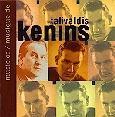 Le compositeur d'origine lettonne, installé
au Canada depuis 1951, fait ici l'objet d'un disque qui a pour but
de nous faire connaître trois étapes de l'évolution du compositeur.
La première pièce, Sonata for cello and piano date de 1950,
soit sa période de jeunesse. Très énergique et tendue, elle est
d'esthétique française, pays où séjournait le compositeur à
l'époque. La deuxième pièce, Concertante for flute and piano
(1966) et la troisième, Piano Quartet no 2 (1979),
constituent respectivement la période intermédiaire et la période de
maturité de Kenins. De durée moyenne, ces trois pièces tracent un
portrait fort éloquent de la façon dont Kenins traite le discours
musical. Des lignes mélodiques qui s'entrechoquent et se chevauchent
dans des dialogues endiablés, une harmonie constamment en mouvement,
des tempo rapides, des rythmes souvent syncopés
et l'utilisation de la forme fuguée laissent peu de répit à
l'auditeur. Ces caractéristiques stylistiques font peut-être en
sorte que la musique de Kenins est moins facilement abordable, mais
elles la rendent d'autant plus intéressante. À découvrir si ce n'est
déjà fait. Jean-Claude Thériault Le compositeur d'origine lettonne, installé
au Canada depuis 1951, fait ici l'objet d'un disque qui a pour but
de nous faire connaître trois étapes de l'évolution du compositeur.
La première pièce, Sonata for cello and piano date de 1950,
soit sa période de jeunesse. Très énergique et tendue, elle est
d'esthétique française, pays où séjournait le compositeur à
l'époque. La deuxième pièce, Concertante for flute and piano
(1966) et la troisième, Piano Quartet no 2 (1979),
constituent respectivement la période intermédiaire et la période de
maturité de Kenins. De durée moyenne, ces trois pièces tracent un
portrait fort éloquent de la façon dont Kenins traite le discours
musical. Des lignes mélodiques qui s'entrechoquent et se chevauchent
dans des dialogues endiablés, une harmonie constamment en mouvement,
des tempo rapides, des rythmes souvent syncopés
et l'utilisation de la forme fuguée laissent peu de répit à
l'auditeur. Ces caractéristiques stylistiques font peut-être en
sorte que la musique de Kenins est moins facilement abordable, mais
elles la rendent d'autant plus intéressante. À découvrir si ce n'est
déjà fait. Jean-Claude Thériault
Sigrid Onégin: Arias
Pearl GEMM CD
9274
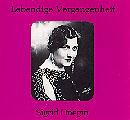 Contralto Sigrid Onégin
(née Elisabeth Hoffman, 1889-1943) belongs to the fabulous lost
world of pre-Word War II super divas. Born of French and German
parentage in Sweden, she married her accompanist, Baron Yevgeny
Borisovich Lvov (Onégin). She bowed at the Met as Amneris in 1922.
The rest is history as these superb Victor/ HMV recordings, made in
1928-1930 testify. Onégin possesed a huge tubular voice with
remarkable flexibility and messa di voce right up to high
pianissimi. Every aria on this disc is a roller coaster ride from
resonant organ-like chest tones to her trademark rock steady,
clarion high notes. Onégin deserves the Jussi Bjoerling Show-Off
Award for her extended trills. The exceptionally fine transfers from
pristine originals make this a must for every opera lover.
Philip Anson Contralto Sigrid Onégin
(née Elisabeth Hoffman, 1889-1943) belongs to the fabulous lost
world of pre-Word War II super divas. Born of French and German
parentage in Sweden, she married her accompanist, Baron Yevgeny
Borisovich Lvov (Onégin). She bowed at the Met as Amneris in 1922.
The rest is history as these superb Victor/ HMV recordings, made in
1928-1930 testify. Onégin possesed a huge tubular voice with
remarkable flexibility and messa di voce right up to high
pianissimi. Every aria on this disc is a roller coaster ride from
resonant organ-like chest tones to her trademark rock steady,
clarion high notes. Onégin deserves the Jussi Bjoerling Show-Off
Award for her extended trills. The exceptionally fine transfers from
pristine originals make this a must for every opera lover.
Philip Anson
Sigrid Onégin: Arias and
Songs
Lebendige Vergangenheit 89027 &;89104
These two Preiser discs contain much material not on the Pearl
disc, including Brahms' Alto Rhapsody, thirteen miscellaneous
lieder, and arias from La Favorita, Don Carlo and
Carmen. Preiser includes the two Samson et Dalila arias in German but not
the French versions (Pearl has all four). Preiser also leaves out
Pearl's remarkable "Exultate, jubilate". Sources and sound quality
are similar on both labels, so the Pearl disc is a good sampler but
completists will want all three discs. Philip
Anson
Soirée française
Michael Schade,
ténor
Russell Braun, baryton (CBC)
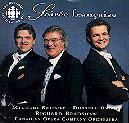 Deux jeunes chanteurs
canadiens, Michael Schade et Russell Braun, partagent un programme
intéressant et visionnaire composé d'extraits de l'opéra
français. Deux jeunes chanteurs
canadiens, Michael Schade et Russell Braun, partagent un programme
intéressant et visionnaire composé d'extraits de l'opéra
français.
Bien sûr, les extraits connus de Hamlet et Les Pêcheurs
de perles (oui, ils chantent le célèbre duo "Au fond du temple
saint" !) s'y retrouvent, mais il y a aussi des pages rares et
attirantes du Roi de Lahore et de Cléopâtre de
Massenet, de Sapho de Gounod et un superbe duo tiré de La
Muette de Portici d'Auber.
Même si la voix de Schade
manque un peu de rondeur et de coffre, il l'utilise avec goût et
sensibilité. On remarque qu'il peut sembler affecté et qu'il se
réfugie trop souvent et trop facilement dans une voix de tête plutôt
blanche. D'ailleurs, on le sent complètement dépassé dans le duo de
Moise. Toutefois, il reste que son phrasé et sa musicalité
sont remarquables.
Le jeune Braun possède une voix de baryton noble, virile et
attachante. Il déploie son timbre riche avec intelligence et
raffinement, même si à l'occasion, son legato manque de souplesse.
Néanmoins, il peut caresser une ligne, comme dans "Leonor viens" de
Donizetti, puis répondre aux critères de virtuosité qu'exige la
scène de Barnabé dans Le Maître de chapelle de
Paer.
Les interprétations de ces deux chanteurs sont
caractérisées par un français presque entièrement idiomatique et un
beau sense du style. Enfin, cet enregistrement bénéficie de
l'acoustique admirable du Massey Hall de Toronto et du concours de
l'orchestre du Canadian Opera Company, dirigé par le sympathique
Richard Bradshaw. Je le recommande avec enthousiasme.
Richard Turp
Serenade
Susan Hoeppner,
flûte
Canadian Chamber Ensemble
Chosei Kmatsu, chef (EMI)
Je n'ai pas osé compter le nombre de disques
de flûte « classico-détente » que l'on retrouve sur les étagères ;
par contre, en dénicher un nombre aussi volumineux n'incarnant pas
le cliché de la flûte « quétaine », c'est un contrat plus laborieux.
La canadienne Susan Hoeppner semble avoir un souci de ce léger
détail et offre une interprétation qui demeure dans les limites du
raisonnable... enfin ! Un beau son, un vibrato pas trop uniforme et
une intonation scrupuleuse font partie des points forts de la jeune
dame. Par surcroît, on y retrouve une sélection de répertoire qui
n'est pas trop conservatrice : tout en maintenant les éternels
Fauré, Ravel et Gluck, la flûtiste bifurque vers un Rachmaninov et
une Suite Paysanne Hongroise de Bartók qui, tout compte fait,
prennent bien leur place sur ce disque. Considérant l'interprète et
le répertoire choisi, cet enregistrement peut constituer un choix
pertinent. Geneviève Rioux
John Tavener: Svyati
Steven Isserlis,
violoncelle
Patricia Rozario, soprano
Daniel Phillips, Krista
Bennion Feeney, violons
Todd Phillips, alto (BMG
09026-68761-2)
Ce disque
renferme cinq oeuvres composées entre 1989 et 1995 par le
compositeur anglais John Tavener. Elles sont essentiellement écrites
pour violoncelle et voix de soprano, véhicules musicaux que
privilégie par dessus tout Tavener. Né en 1944, il n'a cessé, depuis
son premier véritable succès, The Whale en 1968, de nous
surprendre avec des oeuvres au caractère méditatif et contemplatif.
Cet ensemble de cinq pièces que nous propose BMG Classics ne fait
pas exception à la règle. Les lignes mélodiques que l'on retrouve
dans Svyati, la pièce titre, et dans Eternal Memory
entre autres, sont d'une pureté peu commune. On se laisse bercer par
les thèmes pleins de douceur qui sont finement rendus par Isserlis,
interprète fétiche du compositeur. Les autres pièces présentent
aussi de belles choses. C'est le cas notamment des Akhmatova
Songs pour soprano et violoncelle sur six poèmes de Anna
Akhmatova, où la voix de Patricia Rozario est on ne peut plus mise
en évidence pour le plus grand plaisir de nos oreilles. Un excellent
disque pour amateurs de spiritualité. Jean-Claude
Thériault
Graces and Pleasures: A Canadian Vocalise
(Archiv 457-371)
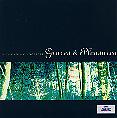 This compilation of
early music arias by Canadian singers is drawn from several complete
Deutsche Grammophon operas and oratorios led by Trevor Pinnock and
The English Concert, John Eliot Gardiner and the English Baroque
Soloists, and Marc Minkowski and Les Musiciens du Louvre. You don't
have to be patriotic to enjoy soprano Ann Monoyios's delectable
arias from Purcell's Dioclesian, Catherine Robbin's three
arias from La Clemenza di Tito and Haydn's Stabat
Mater, or Nancy Argenta's "Fairest Isle". Baritone Gerald
Finley, who will debut at the Met in Die Zauberflöte on January 24, 1998, delivers two superb Papageno
arias and tenor Michael Schade sings Tamino from the same opera. A
handy, impressive anthology. Philip
Anson This compilation of
early music arias by Canadian singers is drawn from several complete
Deutsche Grammophon operas and oratorios led by Trevor Pinnock and
The English Concert, John Eliot Gardiner and the English Baroque
Soloists, and Marc Minkowski and Les Musiciens du Louvre. You don't
have to be patriotic to enjoy soprano Ann Monoyios's delectable
arias from Purcell's Dioclesian, Catherine Robbin's three
arias from La Clemenza di Tito and Haydn's Stabat
Mater, or Nancy Argenta's "Fairest Isle". Baritone Gerald
Finley, who will debut at the Met in Die Zauberflöte on January 24, 1998, delivers two superb Papageno
arias and tenor Michael Schade sings Tamino from the same opera. A
handy, impressive anthology. Philip
Anson
Wagner and Bellini Arias
Jane Eaglen,
soprano
Royal Opera House Orchestra/ Mark Elder (Sony SK
62032)
This first solo
disc by British soprano Jane Eaglen confirms her potential as the
Brünnhilde of tomorrow. Her riveting "Immolation Scene" from
Götterdämmerung and a superb "Ho-jo-to-ho" from Die
Walküre are indelible highlights. Unfortunately Eaglen tries to
pull off the Callas hat-trick, but her Bellini arias and duets,
recorded at a different time, are less convincing. Her "Casta diva"
is whiny and pinched in the lyric mezza voce passages, and
conductor Elder imposes perverse tempi and phrasing. Still, the
album is well worth owning for the Wagner alone. -Philip Anson.
Jane Eaglen will sing Beethoven's "Ah, perfido", Mozart's "Or sai
chi l'onore" &;"Non mi dir", Wagner's "Dich, teure Halle"
&;Brünnhilde's Battle Cry at the National Arts Centre with the
NAC Orchestra under Yves Abel, Jan. 14 &;15, 1997. Box office:
613-594-9400.
Blind Love, Cruel Beauty: Handel's Vocal
Duets
Favella Lyrica (Koch 3-7298-2)
Favella Lyrica is a Boston-based trio devoted
to vocal chamber music of the 17th and 18th centuries. Here soprano
Pamela Murray, mezzo-soprano Pamela Dellal and harpsichordist
Michael Beattie collaborate on Italian chamber duets composed by
Handel between 1710 and 1740. These duets are refined, domestic
compositions suited to the medium-sized, well-matched voices of the
Favella soloists, expertly accompanied by Beattie's deferential but
complementary harpsichord. The recorded sound is astonishingly fine,
transparent and natural. Handel's pot-boilers can seem monotonous,
but if you like the repertoire, you'll love this disc.
Rimsky-Korsakov: The Maid of
Pskov
Kirov Opera / Gergiev (Philips
446-678)
Another
wonderful recording from St. Petersburg's Mariinsky Theatre. This is
the third version (1895) of The Maid of Pskov, also known as
Ivan the Terrible. Rimsky
takes just two hours to tell the story of Tsar Ivan sparing the
rebellious city of Pskov because his illigitimate daughter lives
there. All the usual elements of Russian opera are here: martial
choruses, bell ringing, gossiping contralto nurses, children's
folksongs, and tormented bass monologues. No arias or duets,
however, and barely a hummable tune. Just a powerful narrative
painted in stark primary colors. No one in the world does this rep
as well as the Kirov Opera. All the roles are sung well and acoustic
image is realistic. Philip Anson
Beethoven: Piano Sonatas Vol. 5
Annie
Fischer, piano (Hungaroton HCD 31630)
How lucky we are that
Hungaroton is releasing Annie Fischer's unapproved studio recordings
of the Beethoven sonatas. The great Hungarian was in her sixties
when she recorded these but her touch is sure and her interpretation
is confident. Fischer was eccentric in life but at the keyboard she
lets the music speak for itself. Her combination of the utmost
simplicity with unabashed emotion removes layers of interpretive
obfuscation and brings us back to Beethoven's original conception.
The recorded sound is natural and clean. The Bösendorfer has a
woody, bright tone reminiscent of a pianoforte, appropriate to this
memento of a great tradition. Philip
Anson
Beethoven: Leonore
Orchestre
Révolutionnaire et Romantique
John Eliot Gardiner (Archiv
453-461)
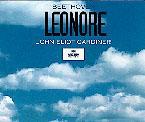 This is only the second
stereo recording of Beethoven's Leonore and in terms of
completeness it is nearly definitive. Gardiner's approach is
scholarly and impassioned, as reflected in the copious notes which
explain his decision to record a version based on Beethoven's 1804-6
scores. The result is a chamber opera bearing little resemblance to
the later Fidelio. Gardiner's Leonore is a Singspiel
with simple arias and duets, little or no recitative, no coups de
theatre, and no big choruses. The scenes are linked by spoken verses
declaimed by a narrator to illustrate the evils of despotism. The
real interest here is in the relation of Leonore to Beethoven's oeuvre and his epoch, though there is
plenty of charming singing by Kim Begley (Florestan), Hillevi
Martinpelto (Leonore), Christine Oelze (Marzelline) and Canadian
tenor Michael Schade (Jaquino). At once educational and enjoyable,
this is a fascinating enterprise. Philip
Anson This is only the second
stereo recording of Beethoven's Leonore and in terms of
completeness it is nearly definitive. Gardiner's approach is
scholarly and impassioned, as reflected in the copious notes which
explain his decision to record a version based on Beethoven's 1804-6
scores. The result is a chamber opera bearing little resemblance to
the later Fidelio. Gardiner's Leonore is a Singspiel
with simple arias and duets, little or no recitative, no coups de
theatre, and no big choruses. The scenes are linked by spoken verses
declaimed by a narrator to illustrate the evils of despotism. The
real interest here is in the relation of Leonore to Beethoven's oeuvre and his epoch, though there is
plenty of charming singing by Kim Begley (Florestan), Hillevi
Martinpelto (Leonore), Christine Oelze (Marzelline) and Canadian
tenor Michael Schade (Jaquino). At once educational and enjoyable,
this is a fascinating enterprise. Philip
Anson
Puccini: La Bohème
Metroplitan Opera
Orchestra/ Giuseppe Antonicelli
Sony MH2K
062762
Here is a fine American
Bohème recorded at the old Met in 1947 with the precious Bidú Sayao
as Mimi and Richard Tucker in splendid voice as Rodolfo. Baccaloni
is a predictably buffo Benoit, Mimi Benzell's Musetta is tart rather
than sweet, Marcello and Colline are sung by sturdy but slightly
rough old stagers. Antonicelli conducts a traditional reading of
Puccini's score, always perfectly phrased and deferential to the
singers. Good recorded sound transferred from master tapes make this
an enjoyable little classic. Philip
Anson
Bach Well-Tempered Clavier: Volume
1
Scott Ross, harpsichord (Pelleas CD-0101/2)
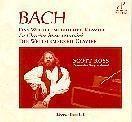 American harpsichordist
Scott Ross's only Well-Tempered Clavier on record is a stunning
accomplishment. It was studio recorded in 1980 by CBC when the 29
year-old Ross was a professor at the Université de Laval (he moved
to France soon after where he was idolised until his AIDS-related
death in 1989). The recorded sound is crystalline with superb
natural presence, capturing every nuance of Ross's playing - and
what playing it is! Ross may have looked like the Rimbaud of early
music but he sounds more like the Victor Hugo of the harpsichord.
His limpid sonorities and elegant lines conjure the humane aspect of
Bach's music. Every one of the 24 preludes and fugues tells its own
story. His subtlety is expressionistic but his overall conception is
Olympian. Enthusiastically recommended. Philip
Anson American harpsichordist
Scott Ross's only Well-Tempered Clavier on record is a stunning
accomplishment. It was studio recorded in 1980 by CBC when the 29
year-old Ross was a professor at the Université de Laval (he moved
to France soon after where he was idolised until his AIDS-related
death in 1989). The recorded sound is crystalline with superb
natural presence, capturing every nuance of Ross's playing - and
what playing it is! Ross may have looked like the Rimbaud of early
music but he sounds more like the Victor Hugo of the harpsichord.
His limpid sonorities and elegant lines conjure the humane aspect of
Bach's music. Every one of the 24 preludes and fugues tells its own
story. His subtlety is expressionistic but his overall conception is
Olympian. Enthusiastically recommended. Philip
Anson
Pergolesi: Livetta e Tracollo/ La Serva
Padrona
La Petite Bande/ Sigiswald Kuijken (Accent ACC 96123
D)
This fabulous recording of Pergolesi's two
crazy musical intermezzi was made at Brussels' Luna Theatre in 1996.
Kuijken gives an absolutely flawless, spirited reading of the witty
scores, proving that Pergolesi is as good as Mozart anyday. Soprano
Nancy Argenta is in peak form as Livetta. and the other soloists are
also top drawer. Extremely vivid recorded sound make this a
treasured addition to the catalogue. Philip
Anson
Le Jardin des Mélodies: Danses et chansons
françaises du XVIe siècle
The King's Noyse. David Douglass,
chef (harmonia mundi 907194)
Ce Jardin de Mélodies est un véritable Jardin
des délices, côté Paradis. Il offre un généreux échantillon (plus de
70 minutes) des "riches divertissements que les ménétriers ont mis
en scène pour les monarques français à la fin de la Renaissance",
comprenant 27 pièces, dont 6 chansons, interprétées par la soprano
Ellen Hargis. La diction est excellente et la voix, ravissante. Bien
évidemment, la prononciation est d'époque (ainsi, "roi" se
prononce-t-il "roé").
Récipiendaire du Diapason d'Or de l'année, catégorie Musique de
la Renaissance, pour les volumes 3 à 5 de l'oeuvre pour luth de
Dowland (également chez harmonia mundi), le luthiste virtuose Paul
O'Dette s'y distingue dans 7 solos.
De la chanson d'ouverture, "Mon Dieu la
belle Entrée", pleine d'un entrain et d'une bonne humeur
communicatifs, jusqu'à la complainte finale, "Hélas faut-il que je
lamente", à la fois subtile et expressive, voilà un disque exquis,
qui procure un plaisir immense. Rodrigue Audet
|


